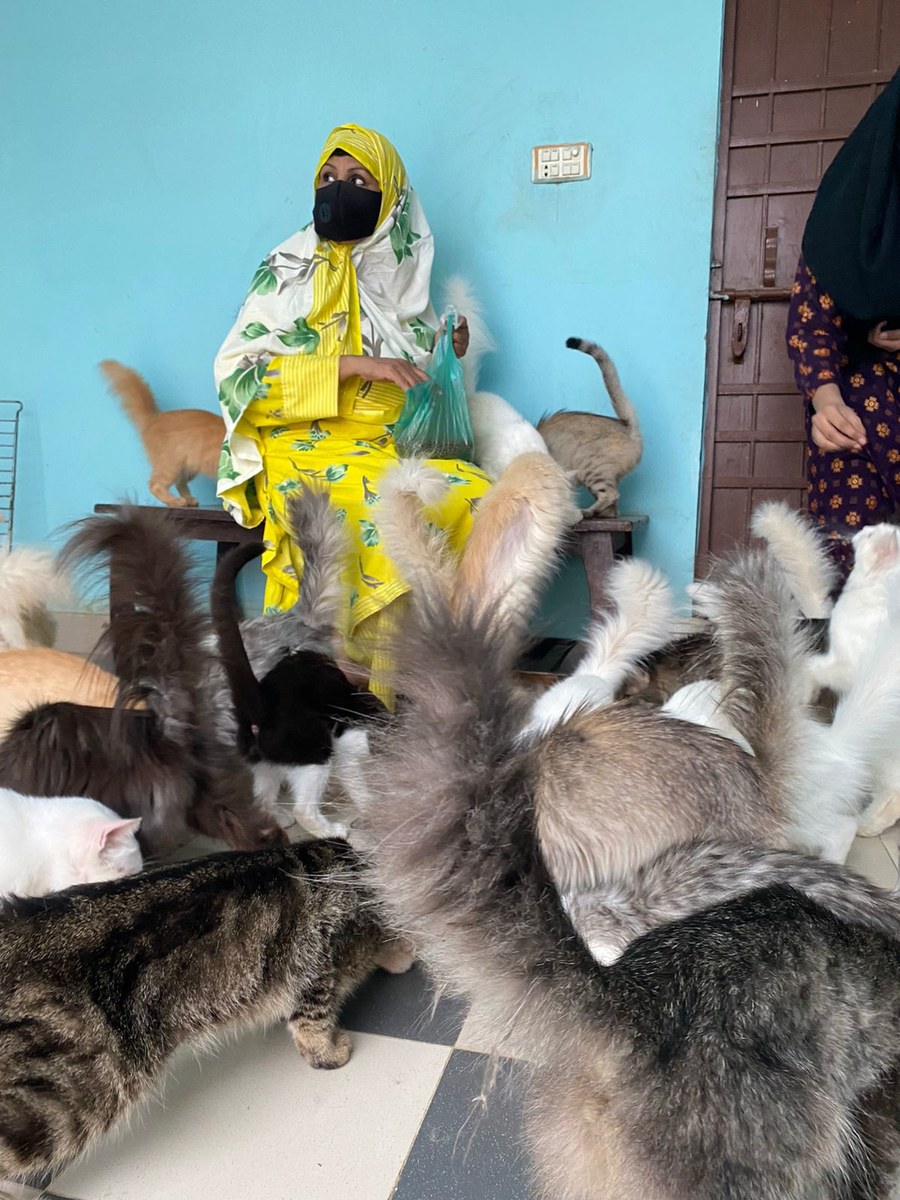KARACHI: Sadia Afaq’s house in Pakistan’s bustling port city of Karachi is unusually crowded.
The reason: Afaq lives there with her husband, six children and 60 cats.
Since losing a beloved pet cat to cancer 15 years ago, Afaq has been on a mission to create a safe haven for any cats in need that cross her path. Whether it’s in response to requests for adoption or the housewife finds stray or ailing cats on the streets, the furry animals can be sure to find a forever home at Afaq’s house in Karachi’s Qur’angi town.
“After that [pet’s death] I was so heartbroken that whenever I saw an ill cat, I would get it treated and keep it with me,” Afaq, 45, told Arab News, as four cats played around her on the sofa on which she sat.

Sadia Afaq, pet owner with her cats in Karachi, Pakistan on August 2, 2023. (AN Photo)
“Whenever I see a cat up for adoption, I take it home, thinking about what kind of place or owners it might end up with. I take them in and take care of them, get them treatment, take care of their food and water. I also get them vaccinated, and vaccinations these days have become very pricey.”
Though Afaq has always loved animals, while her children were growing up, she said she could not take in pets as it would distract from her kids’ upbringing and education.
However, as her children grew older and became independent, she said she could finally devote her attention to caring for and nurturing cats, following in the footsteps of her mother, who also had a soft spot for the feline creatures.
“My sons tell me, ‘Mum, put a limit to the [number of cats]’,” Afaq said, laughing. “And I respond, ‘This is the same as saying one has [too many] kids and you give them away. So, I can’t give them away’.”
The passion comes at a cost. Bills for food and any treatments for the cats can run up to around $200 a month, not a small amount for the wife of a retired government officer.
“I don’t care about the money, I only think about saving their lives,” Afaq said.
“When we purchase groceries, I take the name of Allah and bring their [cat] food in the same shopping bag. I don’t think of them separately at all. I order for them with the same budget as we order for ourselves.”
Afaq even prays for the cats as she does for her own children.
“When I go somewhere, I make a phone call and ask if he [one of her cats called Tom] has come back. When my daughter says, ‘Mum, he hasn’t come [back] all night’, I recite Ayat-ul-Kursi for his safety,” she said, referring to a widely memorized verse of the Qur’an used to ward off evil.
The cats give back to Afaq also, making the heart and blood pressure patient feel better.
“I am a heart patient, so my blood pressure goes up often,” she said. “But when these cats come near me, I forget how unwell I am, and I start feeling better.”
One day, Afaq hopes she can set up a proper shelter for the cats who currently all live in one large room in her house.
“If funds are provided to me, I will make a good home for them where better care can be taken,” she added.
For now, Afaq’s daughters Qurat-ul-Ain and Noor-ul-Ain help her raise the cats and have also formed a deep bond with them.
In fact, Noor-ul-Ain now dreams of a life partner who will share her love for animals.
“It may happen that I have to get married at some point in my life and there could be an issue related to keeping cats, that I am unable to keep them,” the 24-year-old said.
“But I would never want to remove cats from my life until the very end. I wish to have the kind of in-laws who would love all animals from the core of their hearts.”
Afaq added:
“As long as I am alive, I can guarantee that this home for my cats will continue to exist.”















